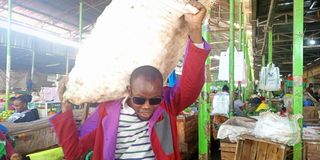How our jobs have been affected by the rains in Nakuru

John Mwangi, an off loader in Wakulima market carries a sack of farm produce from a lorry on May 7,2024.
As the skies darken, clouds gather and thicken, the air feels heavy and humid, and with the stillness or a sense of anticipation, some people pray to their gods hoping they'll hold the rain.
Many of these people are those doing casual jobs in Nakuru. This is because their source of living has been heavily affected by the rains.
Load carriers fondly referred to as beba.
According to John Mwangi, a load carrier in Wakulima market, the rain has affected his job immensely. He says that he cannot offload a lorry when it's raining heavily.
Mwangi adds that on days when the rain prolongs into the night, he cannot offload any lorry especially when the load is very perishable.
“Sometimes we are called to work at night or early in the morning only to find the car was stuck on the way due to bad roads caused by the rains,” he says.
He continues to say that even with the harsh working conditions, the pay has not been increased despite the price increasing for most goods in the market.
Mwangi notes that the money he gets from the job is not enough to buy protective gear like gumboots and raincoats which has resulted to him getting cold-related diseases.
Shoe shiners
We found Moses Mutonyi hurrying to repair a client's shoes not willing to lift his head up for a conversation. After a few minutes, Mutonyi looked up and noted that the rain had affected everybody.
He says that he needs to make sure he gets as many shoes as possible repaired before the rain starts.
Mutonyi notes that when the rain starts, he is forced to pack his luggage and wait until the rain stops because he doesn’t have an umbrella. His job is on the walkway.
He adds that he makes great sales when the weather is not rainy since most people usually think it's useless to polish their shoes yet they will still have mud on the shoes.
Interestingly, when the sun shines after the rain, most people tend to need their services more.
Bicycle riders.

Dominic Rono waits for customers along Kenyatta avenue in Nakuru city on May 7, 2024.
Dominic Rono says that most of the time the rain starts in the evening which has reduced his income significantly.
On a sunny evening, Rono says he can have more than ten customers making an average of Sh 500 but with the rain, the number has reduced significantly.
“The number has reduced because most of the bicycles do not have umbrellas unlike the motorbikes which makes most of our customers opt for the motorcycles,” he says.


